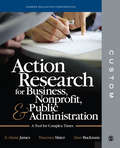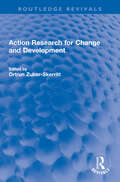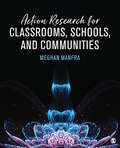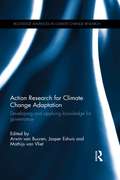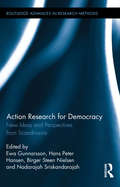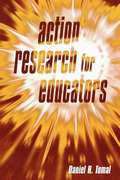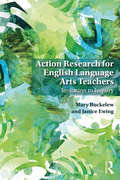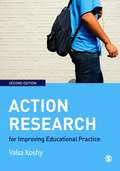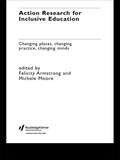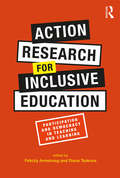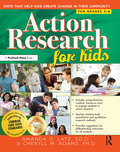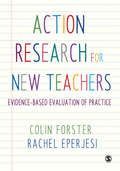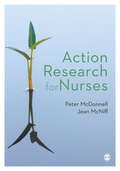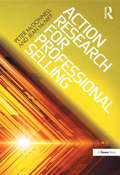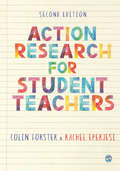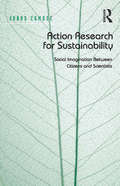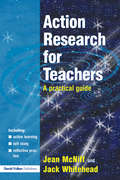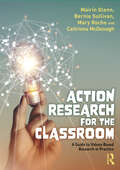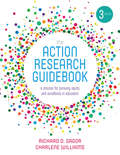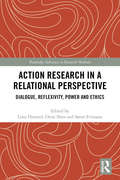- Table View
- List View
Action Research for Business, Nonprofit, and Public Administration (Custom CEC Edition)
by Emily Alana JamesThis book covers the background, process, and tools needed to introduce and guide students through to a successful action research (AR) project. Included are how to initiate, plan, and complete AR within all types of organizations in business, nonprofit, and public administration. Graphic organizers and a modular sequence of topics help students manage the steps involved in AR practice. A protocol for weekly report writing, informed consent documentation, and clear guidelines for final analyses and report writing give graduate students the efficient format they need. This book teaches theory by interweaving discussion of the major content areas and stories of student success with the concepts that impact practice.
Action Research for Change and Development (Routledge Revivals)
by Ortrun Zuber-SkerrittFirst Published in 1991, Action Research for Change and Development presents a collection of papers evolved from an international symposium on Action Research in Higher Education, Government and Industry held in Brisbane in 1989. The book is structured in three parts. Part one consists of reflections on the meaning and theoretical foundation of action research. Part two discusses various aspects of action research methodology; and Part three presents case studies of action research. The aim of the book is to bring together international experts in action research in higher education in order to present and discuss a variety of models of action research which have been developed in parallel in many parts of the world. This book will be an essential read for scholars and researchers of education, higher education, business, industry, and community development.
Action Research for Classrooms, Schools, and Communities
by Meghan M. ManfraAction Research for Classrooms, Schools, and Communities is a core textbook for the action research course. This book addresses the trend toward high-stakes testing and teacher accountability by focusing on understanding student outcomes. With edTPA rapidly becoming part of the requirements for teacher certification, teacher preparation programs will increasingly be looking to measure the impact of the teacher candidate on student learning. The book focuses on the potential for action research to lead to greater understanding about student outcomes from the perspective of teachers, school leaders, and community members. There is a special emphasis on helping pre-service and experienced teachers use action research to understand their impact on student learning. There is an emphasis on using action research to understand community impacts on schools; unlike other books, this text acknowledges the complex ecology linking classrooms, schools, and the community, especially regarding issues fundamental to school reform.
Action Research for Classrooms, Schools, and Communities
by Meghan M. ManfraAction Research for Classrooms, Schools, and Communities is a core textbook for the action research course. This book addresses the trend toward high-stakes testing and teacher accountability by focusing on understanding student outcomes. With edTPA rapidly becoming part of the requirements for teacher certification, teacher preparation programs will increasingly be looking to measure the impact of the teacher candidate on student learning. The book focuses on the potential for action research to lead to greater understanding about student outcomes from the perspective of teachers, school leaders, and community members. There is a special emphasis on helping pre-service and experienced teachers use action research to understand their impact on student learning. There is an emphasis on using action research to understand community impacts on schools; unlike other books, this text acknowledges the complex ecology linking classrooms, schools, and the community, especially regarding issues fundamental to school reform.
Action Research for Climate Change Adaptation: Developing and applying knowledge for governance (Routledge Advances in Climate Change Research)
by Arwin Van Buuren Jasper Eshuis Mathijs Van VlietGovernments all over the world are struggling with the question of how to adapt to climate change. They need information not only about the issue and its possible consequences, but also about feasible governance strategies and instruments to combat it. At the same time, scientists from different social disciplines are trying to understand the dynamics and peculiarities of the governance of climate change adaptation. This book demonstrates how action-oriented research methods can be used to satisfy the need for both policy-relevant information and scientific knowledge. Bringing together eight case studies that show inspiring practices of action research from around the world, including Australia, Denmark, Vietnam and the Netherlands, the book covers a rich variety of action-research applications, running from participatory observation to serious games and role-playing exercises. It explores many adaptation challenges, from flood-risk safety to heat stress and freshwater availability, and draws out valuable lessons about the conditions that make action research successful, demonstrating how scientific and academic knowledge can be used in a practical context to reach useful and applicable insights. The book will be of interest to scholars and students of climate change, environmental policy, politics and governance.
Action Research for Democracy: New Ideas and Perspectives from Scandinavia (Routledge Advances in Research Methods #17)
by Hans Peter Hansen Birger Steen Nielsen Nadarajah Sriskandarajah Ewa GunnarssonContemporary society encounters profound economical, socio-ecological and political crises challenging the democratic foundation of our societies. This book addresses the potentials and challenges for Action Research supporting democratic alternatives. It offers a broad spectrum of examples from Scandinavian Action Research showing different openings towards democratic development. The book’s first part contributes with a wide range of examples such as Action Research in relation to the Triple Helix/Mode II contexts, to design as a democratic process, to renewal of welfare work and public institutions, to innovation policies combining Action Research with gender science. In the second part of the book epistemological and ontological dimensions of Action Research are discussed addressing questions of validity criteria related to Action Research, the transformation of knowledge institutions and the specific character of creativity in Action Research. The book offers a basis for theoretical as well as practical oriented discussions and critical reflections within the field of Action Research and related research orientations, involving a wide range of actors.
Action Research for Educators
by Daniel R. TomalMost research methods are too impractical and painstaking for educators. Teachers and administrators at all levels—elementary, secondary, and university—need a simple, yet powerful book on conducting action research as a viable method for making educational improvements. This user-friendly book covers the principles and history of action research, ethical and legal considerations, how to conduct both formal and informal action research, data collection methods, data analysis and interpretation, planning and initiating action, and evaluating the results of action. Illustrations are included in each chapter.
Action Research for English Language Arts Teachers: Invitation to Inquiry
by Mary Buckelew Janice EwingOffering preservice and inservice teachers a guide to navigate the rapidly changing landscape of English Language Arts education, this book provides a fresh perspective on what it means to be a teacher researcher in ELA contexts. Inviting teachers to view inquiry and reflection as intrinsic to their identity and mission, Buckelew and Ewing walk readers through the inquiry process from developing an actionable focus, to data collection and analysis to publication and the exploration of ongoing questions. Providing thoughtful and relevant protocols and models for teacher inquiry, this book establishes a theoretical foundation and offers practical, ready-to-use tools and strategies for engaging in the inquiry process in the context of teachers’ communities. Action Research for English Language Arts Teachers: Invitation to Inquiry includes a variety of examples and scenarios of ELA teachers in diverse contexts, ensuring that this volume is relevant and accessible to all educators.
Action Research for Improving Educational Practice: A Step-by-Step Guide
by Valsa KoshyWhich topics are right for Action Research in an education context? How do you go about planning a project, collecting and analysing your data? What's the best way to present your research findings to parents, colleagues or funding bodies? Whether you are a busy teacher doing research in your classroom, an undergraduate starting your research project, or a Masters level or education doctorate student writing up your dissertation, this step-by-step guide takes you through every stage involved in carrying out Action Research. In this brand new edition, you will find additional guidance on: - philosophical underpinnings of Action Research - the challenges of being an insider researcher - searching and analysing literature from the internet - children's participation and children's rights in action research projects in educational settings - validity and authenticity in action research - a new chapter on writing for publication - an action research planning sheet. This book draws on Valsa Koshy's extensive experience of supervising researchers at all levels, and includes examples of Action Research carried out by practitioners across a range of topics and age groups. Case studies include UK and international examples, allowing you to reflect on multiple perspectives of Action Research in education. Those new to Action Research, and those looking for a straightforward explanation of the methods involved, will find this book invaluable. Valsa Koshy is Professor of Education and Director of a Research and Development Centre at Brunel University.
Action Research for Inclusive Education: Changing Places, Changing Practices, Changing Minds
by Felicity Armstrong Michele MooreThis book presents and discusses an approach to action research to help reverse discriminatory and exclusionary practices in education. Insider accounts of action research will help challenge assumptions about the limits of inclusive education, and offer examples of how change can be realistically achieved through processes of collaboration and participation. Written by a team of practitioner researchers drawn from a wide range of schools and services, this book addresses a wide range of real-life situations by exploring ways in which teachers have tackled inequalities in the school environment through action research based on principles of equality and democracy. These include: * the co-ordination of services for minority ethnic groups, including refugee and asylum seeking children* young children with autism working with peers in the literacy hour* action research and the inclusion of gay students* developing the role of learning support assistants in inclusion * reducing exclusion of children with challenging behaviour * listening to the voices of young people with severe learning difficulties * developing links between special and mainstream schools * challenging marginalising practices in Further Education.
Action Research for Inclusive Education: Participation and Democracy in Teaching and Learning
by Felicity Armstrong Diana TsokovaExploring practitioner research and the possibilities it creates for increasing student participation and developing inclusive practices in educational contexts, this insightful text presents a range of original and innovative approaches to Action Research, and highlights the critical relationship between educational theory, research and practice in transformative action. Focussing on social constructivist approaches to teaching and learning, Action Research for Inclusive Education offers first-hand insights from researcher-practitioners from international settings including Denmark, Germany, Ireland, Saudi Arabia, Granada, Greece, Singapore and England. Chapters explore diverse participatory and collaborative research practices which draw on the strengths and contributions of teachers and support staff, pupils, and families to foster inclusive practices across the school community and strengthen the participation and independence of all students. Topics considered include collaboration in Participatory Action Research, friendships and the development of students’ social skills, student voice and the role of pupils as co-researchers and peer mentors. Making an important contribution to debates on inclusive education and the role of practitioners and students in bringing about change, this text will be key reading for students, teachers and educational researchers.
Action Research for Kids: Units That Help Kids Create Change in Their Community (Grades 5-8)
by Amanda O. Latz Cheryll AdamsAction Research for Kids provides teachers with comprehensive, creative, and hands-on units to engage students in action research. Students will benefit from learning about quantitative and qualitative research practices that can make a real difference in their lives and those within their communities. Within this text, teachers can select a lesson or use whole units as students explore research methods such as survey research, experimental research, life history, and photovoice in fun lessons that ask them to create a library wish list, interview people in their communities, lobby for cookies in the cafeteria, and experiment with preservatives. Each lesson comes with detailed instructions and ideas for differentiation. Grades 5-8
Action Research for New Teachers: Evidence-Based Evaluation of Practice
by Colin Forster Rachel EperjesiAction research is a popular part of many teacher training courses, but understanding how to do it well isn’t always straightforward. Action Research for New Teachers breaks the process down into small steps giving you concise, jargon-free guidance on all the issues and key considerations that you will need to tackle. It focuses on being evidence-based, encouraging you to produce evidence-rich research projects that are methodologically sound and stand up to scrutiny. This book takes you through the initial stages of planning and research design, engages with the complexities of data collection, and gives you advice on analyzing your data and writing up your research project.
Action Research for New Teachers: Evidence-Based Evaluation of Practice
by Colin Forster Rachel EperjesiAction research is a popular part of many teacher training courses, but understanding how to do it well isn’t always straightforward. Action Research for New Teachers breaks the process down into small steps giving you concise, jargon-free guidance on all the issues and key considerations that you will need to tackle. It focuses on being evidence-based, encouraging you to produce evidence-rich research projects that are methodologically sound and stand up to scrutiny. This book takes you through the initial stages of planning and research design, engages with the complexities of data collection, and gives you advice on analyzing your data and writing up your research project.
Action Research for Nurses
by Peter McDonnell Jean McNiffNurses work in complex situations with daily challenges, where the needs of each patient represent unique demands. Action research helps nurses to investigate their practices as reflective practitioners, allowing them to ask ‘What is going on? How do we understand the existing situation? How do we improve it?’ This book supports nurses in investigating their own professional practices in order to develop the new insights and approaches: · embodying holistic perspectives in dialogical and relational forms of individual and organisational learning, · equal emphasis on processes and outcomes; · welcoming all participants’ contributions , and listening to all voices; · developing a patient-centred focus where people are involved in their own healing; · building communities of enquiring practices. This book is intended for undergraduate student nurses, qualified practising nurses in clinical settings who may or may not be engaged in formal professional education courses and nurse educators and managers.
Action Research for Nurses
by Jean Mcniff Peter McdonnellNurses work in complex situations with daily challenges, where the needs of each patient represent unique demands. Action research helps nurses to investigate their practices as reflective practitioners, allowing them to ask 'What is going on? How do we understand the existing situation? How do we improve it?' This book supports nurses in investigating their own professional practices in order to develop the new insights and approaches: · embodying holistic perspectives in dialogical and relational forms of individual and organisational learning, · equal emphasis on processes and outcomes; · welcoming all participants' contributions , and listening to all voices; · developing a patient-centred focus where people are involved in their own healing; · building communities of enquiring practices. This book is intended for undergraduate student nurses, qualified practising nurses in clinical settings who may or may not be engaged in formal professional education courses and nurse educators and managers.
Action Research for Professional Selling
by Jean McNiff Peter McDonnellAction Research for Professional Selling by Peter McDonnell and Jean McNiff is for people working, or hoping to work in sales, who wish to improve their capacity for selling, and who may be involved in providing or participating in a structured sales training programme. It provides a basis for professional selling that connects the sales process to different philosophical models for understanding human interactions and contains much practical advice for selling in a tough economic environment. Action research is used across the professions as a powerful methodology for improving performance and outcomes and will enable sales practitioners to generate their practical theories of selling. The book answers calls for evidence-based practice in sales education, placing special emphasis on the strength of a values-based approach over the outmoded manipulative models of the past (many of which are still in evidence). It is essential to develop your understanding of what you are doing, and be able to explain it, and the book shows you how to do this through researching your practice in action. It focuses seriously on selling as a field of research offering an innovative, practical approach to selling, underpinned by strong theoretical and philosophical frameworks.
Action Research for Student Teachers
by Colin Forster Rachel EperjesiAction research is a popular part of many teacher training courses but understanding how to do it well is not always straightforward. Previously known as Action Research for New Teachers, this book will guide you through each step of the process, from initial stages of planning and research, through to how to analyse your data and write up your research project. This second edition includes: · A new ‘Critical task’ feature, with suggested responses · Discussion of where action research ‘fits’ in the word of education research · Exploration of the skills and attributes needed for undertaking action research · Guidance on how to write with clarity and purpose.
Action Research for Student Teachers
by Colin Forster Rachel EperjesiAction research is a popular part of many teacher training courses but understanding how to do it well is not always straightforward. Previously known as Action Research for New Teachers, this book will guide you through each step of the process, from initial stages of planning and research, through to how to analyse your data and write up your research project. This second edition includes: · A new ‘Critical task’ feature, with suggested responses · Discussion of where action research ‘fits’ in the word of education research · Exploration of the skills and attributes needed for undertaking action research · Guidance on how to write with clarity and purpose.
Action Research for Sustainability: Social Imagination Between Citizens and Scientists
by Jonas EgmoseHow can action research further new research orientations towards sustainability? This book, empirically situated in the field of upstream public engagement, involving local residents, researchers and practitioners in bottom-up processes deliberating on urban sustainability, answers this question by analysing processes of social learning. The book addresses the need to move towards sustainability at societal level as a democratic challenge questioning the way we live on planet earth. By conceptualising sustain-ability as an immanent and emergent ability of ecological and social life, continuously to renew itself without eroding its own foundation of existence, it argues that since sustainability cannot be invented but only supported (or eroded) by science, we need to reframe science in the role of sustaining sustain-ability. Through analyses of a three year action research programme, aiming to provide local citizens with a greater say in the future of urban sustainability research, this book shows how action research can make important methodological contributions to processes of social learning between citizens and scientists by enabling free spaces in peoples everyday life and within academia, where aspects of un-sustainability can be addressed and new imaginations of more sustainable futures emerge.
Action Research for Teachers: A Practical Guide
by Jack Whitehead Jean McNiffAssuming no prior knowledge of research methods and techniques, this book is the perfect companion for teachers at all levels undergoing professional development who need to enhance their formal reflection skills. Providing a detailed explanation of what action research is and its importance in terms of whole school development, this book invites the teachers to try out educational research for themselves and adopt an investigative attitude that will help improve and evaluate practice. It includes: * Support and guidance that help you tackle key issues * "Real-life" practical case studies that underline what action research is and how it can be effectively used.
Action Research for the Classroom: A Guide to Values-Based Research in Practice
by Máirín Glenn Bernie Sullivan Mary Roche Caitriona McDonaghWhat is action research? Why does it matter in education? This practical and accessible book provides answers to these questions, guiding readers through a meaningful and manageable approach to research in practice. Readers will benefit from guidance on easing the stress of research projects in teacher education courses, professional development initiatives and in school self-evaluation. Supported by case studies from teachers’ and student teachers’ practice, chapters guide readers through key aspects of carrying out a research project, including: planning a research project collecting and using data presenting evidence generating theory writing up and disseminating your research a theoretical rationale to show why the research is conducted in this way Written in an accessible manner by experienced classroom teachers and academic researchers, this is an essential read for those conducting research on their own practice as part of their professional learning. Action Research for the Classroom shows how teacher research is drawn from the reality of busy life in the classroom and that it can be undertaken in the most complex learning environments, creating positive change for teaching and learning.
The Action Research Guidebook: A Process for Pursuing Equity and Excellence in Education
by Richard D. Sagor Charlene Denise WilliamsThink of yourself as an educational architect By tapping into the power of action research, you can improve overall student performance, eliminate achievement gaps, and enhance your own efficacy and morale. In the third edition of this bestselling guidebook, you’ll find: New insights on how to use reflective practice, qualitative and quantitative methods, and culturally responsive teaching to improve the success of all students A field-tested, four-stage action research process to lead you from brainstorming to breakthrough Illustrative examples, charts, handouts, worksheets, and sample action research reports to demystify and simplify the action research process
The Action Research Guidebook: A Process for Pursuing Equity and Excellence in Education
by Richard D. Sagor Charlene Denise WilliamsThink of yourself as an educational architect By tapping into the power of action research, you can improve overall student performance, eliminate achievement gaps, and enhance your own efficacy and morale. In the third edition of this bestselling guidebook, you’ll find: New insights on how to use reflective practice, qualitative and quantitative methods, and culturally responsive teaching to improve the success of all students A field-tested, four-stage action research process to lead you from brainstorming to breakthrough Illustrative examples, charts, handouts, worksheets, and sample action research reports to demystify and simplify the action research process
Action Research in a Relational Perspective: Dialogue, Reflexivity, Power and Ethics (Routledge Advances in Research Methods)
Action Research in a Relational Perspective brings together an expert international academic team to present theoretical perspectives on social constructionist understandings of action research, as well as illustrative examples of action research practices within a wide range of sectors such as organizational learning, leadership development, education, mental health and health care. Building bridges between theory and practice, this book explores themes of dialogue, relationships, tensions, power and ethics in action research projects. It examines both the great potential, and the challenges and dilemmas, of action research. It aims to inspire readers with ideas and a practical "how-to" understanding of doing action research from a social constructionist standpoint. Action Research in a Relational Perspective will appeal to theoreticians and practitioners, senior researchers and PhD students, students, consultants, educators and managers who are interested in action research as an approach to organizational learning, team development, learning among professionals and citizens, or community development.
